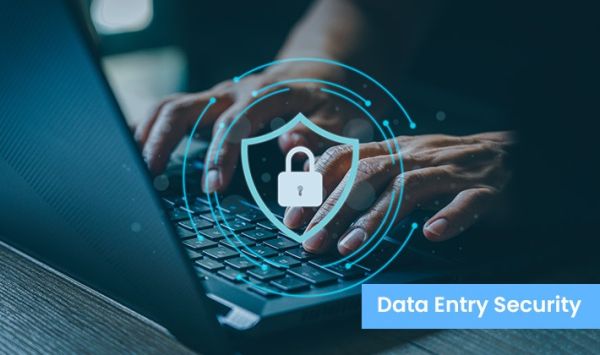Data entry security is crucial in the digital age since so much information is handled regularly. Organizations handle a vast amount of sensitive data, from financial records to personal information; thus, protecting this type of information is vital. The importance of data entry security, possible dangers from security breakdowns, and the safest methods for protecting sensitive data during data entry procedures are all covered in this article.
Importance of Data Entry Security
- Confidentiality and Trust
Businesses deal with a range of sensitive data, such as proprietary information, financial records, and customer information. Retaining the privacy of such data is essential to earning and keeping the confidence of stakeholders, clients, and consumers.
- Legal Compliance
Strict adherence to various data protection rules and regulations, including GDPR, HIPAA, and CCPA, is required while managing and storing sensitive data. There may be serious legal repercussions as well as financial penalties for breaking these rules.
- Reputation Management
An organization’s reputation may be negatively impacted for some time by data leaks. Data breaches may cause partners, clients, and consumers to lose faith in the organization, which could hurt sales and damage the company’s reputation.
- Financial Security
Cybercriminals have financial information as one of their main targets. Safeguarding confidential financial information is essential not just for the parties concerned but also for the organization’s overall financial health and security.
Potential Risks in Data Entry
- Unauthorized Access
Unauthorized access to sensitive data might result from inadequate authentication procedures and access controls. Strong user authentication procedures must be put in place in order to stop unauthorized individuals from accessing confidential data.
- Data Leakage
During the data-entering procedure, unintentional data leaks can happen. Sensitive information could be inadvertently sent to the wrong people or exposed through unsecured channels by staff members. Strict data handling procedures must be put in place to stop these kinds of things from happening.
- Malicious Attacks
Data security is being threatened by ransomware, malware, and phishing scams. In the event that an attack is successful, confidential data may be compromised, resulting in monetary losses and perhaps legal consequences.
- Insider Threats
Workers who intentionally breach security or those with malevolent intent might be quite dangerous. Insider breach threats can be reduced by putting monitoring systems and personnel training programs into place.
Best Practices for Data Entry Security
- Encryption
It is essential to encrypt sensitive data both in transit and in storage. This guarantees that the data will remain unreadable in the event of unwanted access and requires the right decryption key.
- Access Controls
Establish stringent access controls, allowing staff members access to only the information required for their jobs. Review and adjust access permissions on a regular basis to reflect changes in job duties.
- Regular Audits and Monitoring
Perform routine security audits to find gaps and weak points in the data entry system. In order to identify and react quickly to any suspicious activity, put continuous monitoring into place.
- Employee Training
Employees should get training on data security best practices, with a focus on the value of confidentiality and the possible consequences of handling sensitive data improperly. Update training materials frequently to reflect new developments in cybersecurity risks.
- Secure Data Entry Software
Invest in user authentication, secure transmission protocols, and encryption-equipped secure data entry applications. Update and patch software often to fix any known vulnerabilities.
- Data Backups
Make regular backups of important data to guard against irreversible loss in the event of a security breach. To guarantee data integrity, verify the restoration procedure and safely store backups.
Conclusion
In the digital age, data entry security is a critical component of corporate accountability. Ensuring the security of confidential data not only safeguards individual interests but also sustains legal compliance and fosters stakeholder trust. To reduce the risks related to data entry, it is imperative to prioritize employee training, conduct frequent audits, and have strong security measures in place. Check out Tranisics most secure data entry services for your business.





